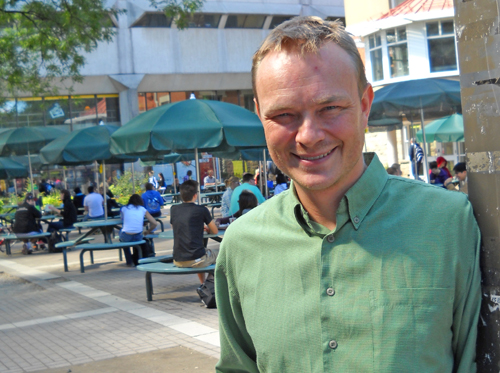
“This is one of the defining challenges of the next 100 years.”
How to feed a growing and ever-hungrier world likely to total nine billion human mouths in this century? That’s the question that has occupied Prof. Evan Fraser for years, perhaps beginning as early as his undergrad summers spent labouring on his grandparents’ farm. Now it’s brought the researcher and author to Guelph, where he hopes to help answer the question ─ and perhaps help to stave off another collapse of civilization in the process.
Fraser joined the Department of Geography this past summer on a wave of publicity over his new book, Empires of Food: Feast, Famine and the Rise and Fall of Civilizations. Co-authored by Andrew Rimas, a Boston journalist, the volume has garnered media attention for its message about the potential failure of our global food system.
Without big changes in how we produce, store and transport food, we’re heading for a worldwide crash, says Fraser. All the signs today ─ specialized crops, complex production and trade systems, reliance on fossil fuels ─ echo the pre-collapse state of earlier empires from the ancient Mesopotamians to the medieval Europeans. “That can’t continue,” he says. “Something has to change.”
In those earlier cases, something ─ weather, overpopulation ─ caused the collapse. For all our 21st-century sophistication, says Fraser, we’re still perilously reliant on a few factors, notably good weather and cheap oil. And, at least in the developed world with its relatively cheap and abundant food, a good dose of luck.
“I don’t think optimism is a useful attribute,” he says. “Risk management is the right approach.”
The right approach? What he calls nested bio-regionalism. We need to marry that global trading network with local, diverse production and consumption, says Fraser, adding that such a system will require a few radical-sounding changes, including government regulation and food prices that reflect real input costs.
In many ways, we need to look back a couple generations to, say, his grandparents’ day.
It was during summers spent working on his forebears’ 100-acre farm near Welland, Ont., that Fraser learned two key lessons. One ─ what he calls an example of “life’s little ironies” ─ came on the afternoon he encountered his grandmother returning home from the office. In her sixties, she had found a new and successful career as a stockbroker.
That afternoon she pulled up in her club car to greet her grandson, who was labouring in the strawberry patch. “She had made more money that afternoon than I would for the entire summer.”
The other lesson led more or less to Fraser’s book and career, including his new posting at Guelph.
Drought threatened the corn crop one summer; the stalks were bent and yellowed. Far from writing off the crop, Fraser, his grandfather and another worker spent two days hilling up the plants to anchor their roots and rigging up an irrigation system. They saved the crop.
A few years later, another drought occurred. This time, with no labourers available, the crop failed. It wasn’t just the weather conditions that mattered, says Fraser: “Adaptive capacity makes the difference.”
With the effects of climate change and population increases looming, it’s easy to be pessimistic about prospects for the food system, he says. But success or failure is not deterministic. He’s a believer in human adaptability and in spreading risk ─ an idea he figures his grandmother would have applauded.
Besides smarter regulation and food prices, he believes we need something else: smarter consumers. People need to learn about the benefits of a new food system, including such movements as fair trade and organic farming.
Fraser plans to continue studying these ideas here at Guelph. He’ll look at local production and marketing operations, including farmers’ markets and community-supported agriculture (CSA). New to Guelph, he and his wife, Christine De Vuono, have checked out the downtown farmers’ market, joined a CSA for produce and plan to fill their freezer with locally produced beef.
He’s also watching the big picture, including studying food security crises, socioeconomic forces, landscapes, regional issues and public awareness. Among other projects, he plans to continue studies of crop and climate models with British collaborators ─ he came to Guelph from a faculty position at the University of Leeds ─ and is plotting a new book whose working title is Weathering the Coming Storm. He’ll write that volume with Rimas, also his co-author on Beef: The Untold Story of How Milk, Muscle and Meat Shaped the World published in 2008.
Although he’s never lived or studied in Guelph, his move here is a kind of homecoming. His paternal grandfather, Frank, graduated from the Ontario Agricultural College in 1937 before buying that Niagara-area farm. Frank’s brother, Joseph, graduated in 1940.
Evan’s mother, Nancy, graduated from the social sciences in 1969. His father, David, studied in Toronto and Glasgow and is now a professor in animal welfare at the University of British Columbia, but he has lectured at Guelph.
Evan Fraser says it makes sense for him to land in southern Ontario’s agribusiness cluster. Here on campus, he’s eager to explore research connections with numerous departments, including Food Science, Political Science, and the School of Environmental Design and Rural Development.